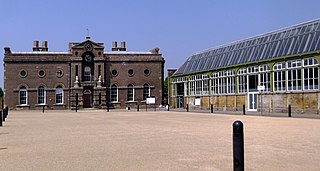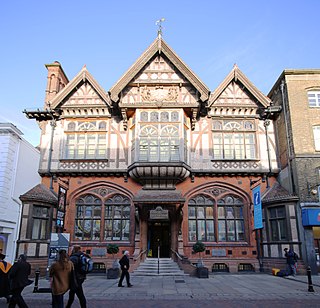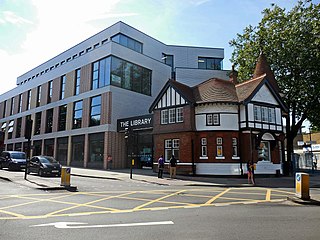
Birmingham Museum and Art Gallery (BM&AG) is a museum and art gallery in Birmingham, England. It has a collection of international importance covering fine art, ceramics, metalwork, jewellery, natural history, archaeology, ethnography, local history and industrial history.

Wrexham is a city and the administrative centre of Wrexham County Borough in Wales. It is located between the Welsh mountains and the lower Dee Valley, near the border with Cheshire in England. Historically in the county of Denbighshire, and later the county of Clwyd in 1974, it has been the principal settlement of Wrexham County Borough since 1996.

Wrexham County Borough is a county borough, with city status, in the north-east of Wales. It borders the English ceremonial counties of Cheshire and Shropshire to the east and south-east respectively along the England–Wales border, Powys to the south-west, Denbighshire to the west and Flintshire to the north-west. The city of Wrexham is the administrative centre. The county borough is part of the preserved county of Clwyd.

The William Morris Gallery is a museum devoted to the life and works of William Morris, an English Arts and Crafts designer and early socialist. It is located in Walthamstow at Water House, a substantial Grade II* listed Georgian home. The extensive grounds of the building are a public park, known as Lloyd Park.

Preston Hall is an early 19th century mansion house at Preston-on-Tees, about 4 km south of the centre of Stockton-on-Tees, England. It has been a museum since 1953 and is owned by Stockton-on-Tees Borough Council. It is a listed building. The house stands in 100 acres (0.40 km2) of parkland. The grounds of the house form Preston Park.

The Rugby Art Gallery and Museum is a combined art gallery and museum in central Rugby, Warwickshire, in England. The purpose-built building housing it is shared with Rugby library; it was opened in 2000 and was built in the place of Rugby's previous library.

Pitzhanger Manor is an English country house famous as the home of neoclassical architect, Sir John Soane. Built between 1800 and 1804 in what is now Walpole Park Ealing, to the west of London), the Regency Manor is a rare and spectacular example of a building designed, built and lived in by Sir John Soane himself. Soane intended it as a domestic space to entertain guests in, as well as a family home for a dynasty of architects, starting with his sons.

The Jewish Museum London was a museum of British Jewish life, history and identity. The museum was situated in Camden Town in the London Borough of Camden, north London. It was a place for people of all faiths to explore Jewish history, culture, and heritage. The museum had a dedicated education team, with a programme for schools, community groups and families. Charles, Prince of Wales was a patron of the museum.

Greenwich Heritage Centre was a museum and local history resource centre in Woolwich, south-east London, England. It was established in 2003 by the London Borough of Greenwich and was run from 2014 by the Royal Greenwich Heritage Trust until the centre's closure in July 2018. The museum was based in a historic building in Artillery Square, in the Royal Arsenal complex, which was established in the 17th century as a repository and manufactory of heavy guns, ammunition and other military ware.

Valence House Museum is the only surviving of the five manor houses of Dagenham. The timber-framed museum building, partially surrounded by a moat, is situated in Valence Park off Becontree Avenue, in the London Borough of Barking and Dagenham, London, England. The building has been used as a manor house, a family home, a town hall, the headquarters of the library service and now houses a museum.
The city of Wrexham has two main city parks, these being Bellevue Park and Acton Park. On the outskirts of the city there is also open parkland on and surrounding the Erddig estate. There is also a city centre green and various smaller parks and open spaces.

The Beaney House of Art and Knowledge is the central museum, library and art gallery of the city of Canterbury, Kent, England. It is housed in a Grade II listed building. Until it closed for refurbishment in 2009, it was known as the Beaney Institute or the Royal Museum and Art Gallery. It reopened under its new name in September 2012. The building, museum and art gallery are owned and managed by Canterbury City Council; Kent County Council is the library authority. These authorities work in partnership with stakeholders and funders.

The Library at Willesden Green is a public library complex situated in Willesden Green, London, United Kingdom. The centre includes a public library which spans over 3 floors, and includes a library for children. It includes 40,000 books, and offers computer and study spaces. The library is operated by Brent Council and houses governmental archives on Brent. Since 2006, the Brent Museum has been located in the building and since the 2015 redevelopment, a performing arts space, as well as an art exhibition gallery, was added to the building.

Wrexham Archives and Local Studies holds the archives for the city of Wrexham. The archives are held at County Buildings, on Regent Street, Wrexham, and run by Wrexham County Borough Council as part of its Wrexham Archives and Local Studies Service. The centre was initially named after local Wrexham historian Alfred Neobard Palmer. The building is shared with Wrexham County Borough Museum and the archives opened in 2002.

Ashburton Art Gallery and Heritage Centre is an art gallery and museum complex located in the town of Ashburton, New Zealand, owned and operated by the Ashburton District Council. The Ashburton Museum opened in 1972 and moved along with the Ashburton Art Gallery into former County Council buildings in 1995. The museum moved into a new purpose-built facility in 2014, the art gallery following it in 2015. Both institutions merged into a single organisation under the Ashburton District Council in 2021.

County Buildings is a Grade II listed building in Wrexham, Wrexham County Borough, Wales. It currently houses the Wrexham County Borough Museum and Wrexham Archives. By 2026, the building would become one museum, dedicated to both Wrexham and Welsh football heritage. The building is located between Saint Mark's Road and Regent Street in the city centre and Offa, bounded by Wrexham Cathedral to the west.

Wrexham Museum is currently undergoing redevelopment for the addition of collections dedicated to Welsh association football. Proposals for a national football museum had been proposed by various politicians in both the Welsh Government and local councils. Wrexham County Borough Council emerged as the leading contender for the location of a museum due to Wrexham's football heritage. By 2026, the new museum dedicated to both Wrexham and Welsh football is set to open within the pre-existing County Buildings on Regent Street, in Wrexham's city centre, merging together with Wrexham County Borough Museum and Archives.

Tŷ Pawb is an arts centre in Wrexham, Wales. It serves as a venue for arts, cultural and community events, as well as being a market and art gallery. A redevelopment of the former Wrexham People's Market between Chester Street and Market Street in Wrexham city centre, the community centre opened on 2 April 2018. It provides exhibitions, a gallery, a food court, small stage concerts and live events, as well as a market space for local traders and the relocation of Oriel Wrecsam. A multi-storey car park is located on top of Tŷ Pawb, on the building's upper floors.

Wrexham Library is the main public library of Wrexham, Wales. Located in the city centre, adjacent to Llwyn Isaf, it opened in 1972, superseding the old carnegie library on Queen's Square.
The National Contemporary Art Gallery for Wales is a proposed branded network of art galleries distributing Wales' existing contemporary art collection. It is being developed by a partnership of Amgueddfa Cymru – Museum Wales, the Arts Council of Wales, the Welsh Government and the National Library of Wales. The proposal formed part of the 2021 Welsh Labour–Plaid Cymru agreement.




















